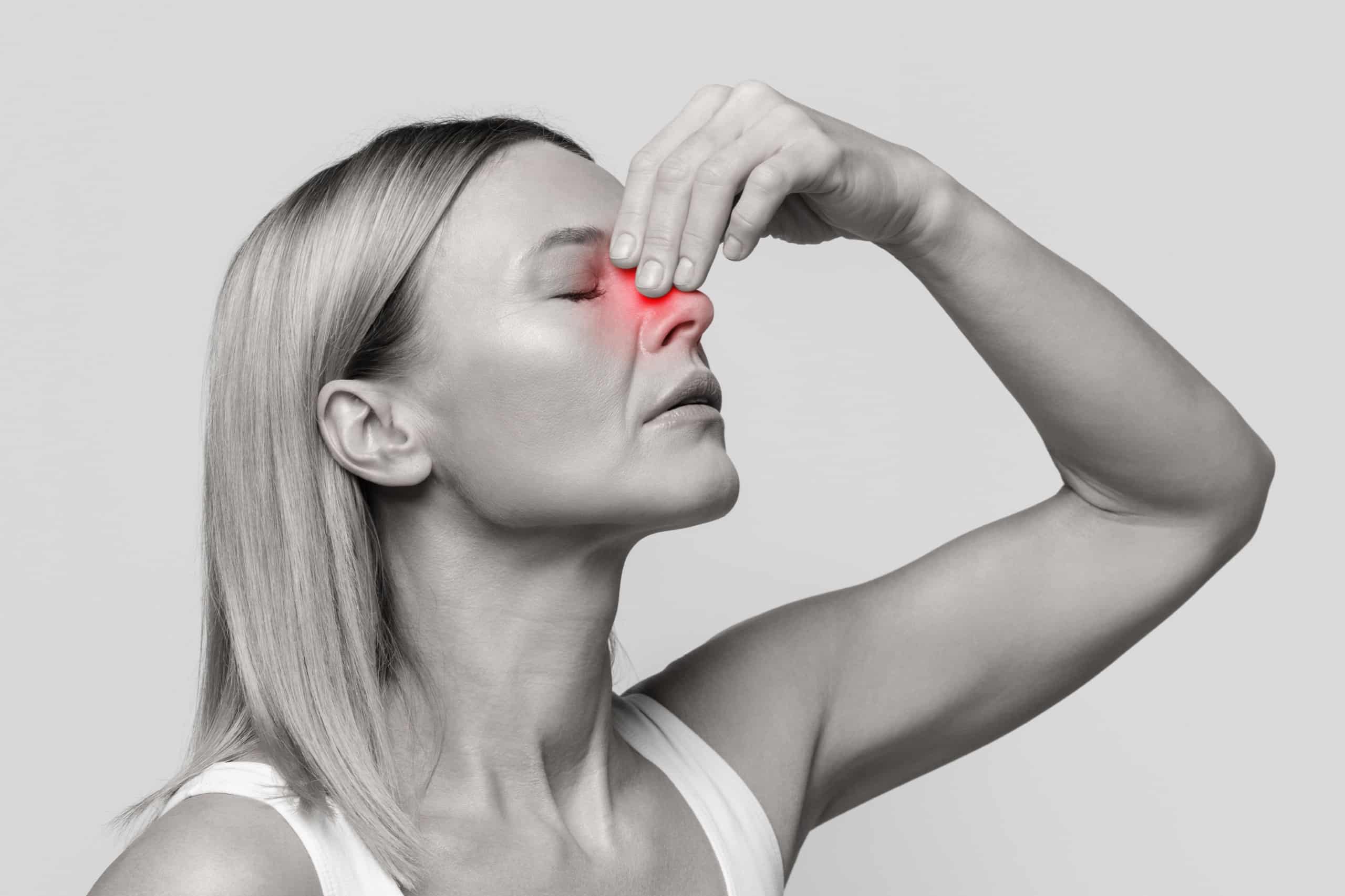The Difference Between Rhinitis and Sinusitis

Two common conditions that affect the nose and sinuses are rhinitis and sinusitis. While often mistaken as the same ailment, they are actually two distinct conditions. Read on to learn more about the differences between them and the effective treatment options available at our office.
What is Rhinitis?
Rhinitis is an inflammation of the nose and nasal passages. There are several different types of rhinitis, including acute rhinitis, allergic rhinitis, and nonallergic rhinitis.
- Acute Rhinitis: Caused by a viral illness.
- Allergic Rhinitis: Caused by seasonal allergies. Allergens in the air trigger the release of histamine in the body, causing itching and swelling in the nasal passages, sinuses, and eyelids.
- Nonallergic Rhinitis: Rhinitis that is present year-round.
Common symptoms of rhinitis include congestion, sneezing, stuffy nose, runny nose, and postnasal drip that can cause a sore throat, itchy eyes, and even snoring. Individuals with asthma are typically at a higher risk of rhinitis, especially allergic rhinitis.
There are many possible causes of rhinitis, including:
- Pollen from trees, grass, and weeds
- Mold
- Dust mites
- Fumes and odors
- Temperature
- Weather changes
- Smoke
- Certain medications
- Certain foods or spices
Rhinitis Treatment Options
The best treatment for rhinitis is to avoid the allergens that are causing the problem. Other treatment options for rhinitis may include antihistamines, nose sprays, decongestants, medications for asthma symptoms, and allergy shots.
At AOO | ENT Specialists of the Rockies, we offer at-home allergy shots and sublingual drops for rhinitis patients. We also offer two new technologies for rhinitis: RhinAer and VivAer.
Allergy Shots
Allergy shots are infections that help reduce or prevent allergy symptoms. Because allergens cause the immune system to overreact, leading to allergy symptoms, allergy shots slowly desensitize your body to the allergen, changing your body’s reaction from inflammation to tolerance. At our practice, we can either administer the shots in-office, or patients can self-administer at home.
Sublingual Drops
Sublingual drops, or allergy drops, work similarly to allergy shots by slowly delivering increased doses of antigens to retrain your system to tolerate allergens. Allergy drops are placed underneath the tongue. Our drop program requires one drop three times a day.
RhinAer and VivAer
The RhinAer and VivAer procedures are effective treatments for improving nasal airflow. They both employ low-temperature radiofrequency energy but differ in that they each target different underlying causes of nasal obstruction.
VivAer is a minimally invasive treatment for patients suffering from nasal airway obstruction caused by structural issues such as a deviated septum, nasal valve collapse, or enlarged turbinates. RhinAer is a treatment for chronic rhinitis. It works to disrupt the nerve signals responsible for chronic rhinitis symptoms such as runny nose, nasal congestion, and postnasal drip.
What is Sinusitis?
Sinusitis is an infection of the sinus lining. It causes inflammation of the air-filled tissues surrounding the nose and symptoms similar to rhinitis, such as congestion, itchy nose and eyes, sore throat, and snoring. However, with sinusitis, patients often experience a thick, green, or yellow discharge as well.
Sinusitis, or a sinus infection, may occur after a cold, which inflames the nasal passages. Allergies can also cause swelling and mucus production, leading to sinusitis.
There are four different types of sinusitis, including:
- Acute Sinusitis: These symptoms last for less than four weeks and clear up with the correct care.
- Subacute Sinusitis: This infection does not improve with treatment at first. Symptoms last for 4-8 weeks.
- Chronic Sinusitis: Chronic infection occurs with repeated, poorly treated acute infections. Symptoms last for eight weeks or more.
- Recurrent Sinusitis: Recurrent sinusitis occurs when you have three or more episodes of acute sinusitis in one year.
Sinusitis Treatment Options
Treatment for sinusitis is often similar to that of rhinitis, with the addition of an antibiotic in cases where sinusitis is caused by bacteria. Antibiotics will not be effective in treating viral infections. Further treatment measures may be recommended for individuals with chronic or recurrent sinusitis.
Can You Prevent Sinusitis and Rhinitis?
Patients can take some steps to prevent these conditions. These include avoiding smoking, getting enough sleep, exercising, using nasal saline rinses, controlling allergies, keeping dust levels down in the home, and more. For additional tips on how to prevent these conditions, speak with your otolaryngologist today.
Schedule a Consultation in Denver, Lone Tree or Castle Rock Today
If you are seeking professional care for rhinitis and/or sinusitis, our team of professionals can help. Please contact AOO | ENT Specialists of the Rockies today to learn more. We are happy to assist patients in the Lone Tree, Highlands Ranch, Parker, and Castle Pines areas.




